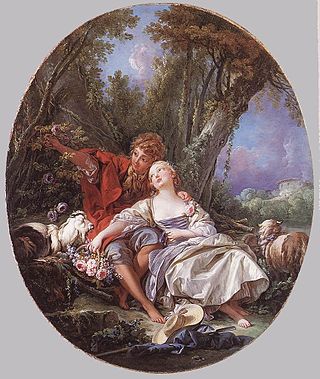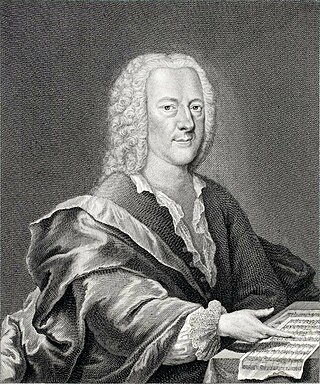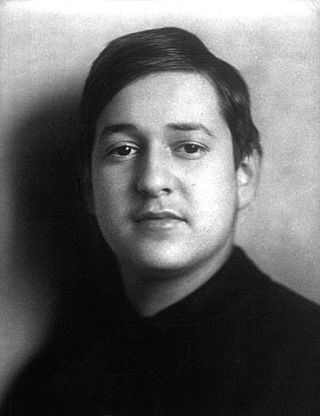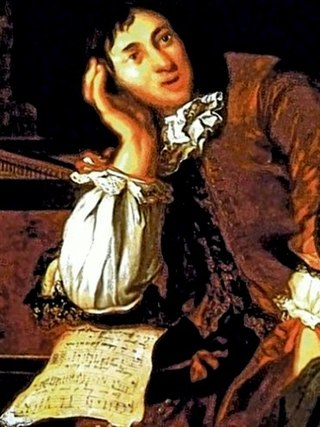Related Research Articles

La clemenza di Tito, K. 621, is an opera seria in two acts composed by Wolfgang Amadeus Mozart to an Italian libretto by Caterino Mazzolà, after Pietro Metastasio. Mozart began the work while he was finishing Die Zauberflöte, the last of his principal operas. La clemenza di Tito premiered on 6 September 1791 at the Estates Theatre in Prague.

Georg Philipp Harsdörffer was a Jurist, Baroque-period German poet and translator.
Mona Lisa, Op. 31, is a 1915 opera by the German composer Max von Schillings on a libretto by Beatrice von Dovsky. It was dedicated to the Philosophy Faculty of the University of Heidelberg, where the composer was awarded the title of professor.

Bastien und Bastienne, K. 50 is a one-act singspiel, a comic opera, by Wolfgang Amadeus Mozart.

Von heute auf morgen is a one act opera composed by Arnold Schoenberg, to a German libretto by "Max Blonda", the pseudonym of Gertrud Schoenberg, the composer's wife. It is the composer's opus 32.

L'arbore di Diana is an opera in two acts composed by Vicente Martín y Soler, with an original libretto by Lorenzo da Ponte. It premiered at the Burgtheater in Vienna on 1 October 1787.
Der Golem is an opera in three acts by composer Eugen d'Albert. The work uses a German language libretto by Ferdinand Lion after Arthur Holitscher's 1908 play Der Golem: Ghettolengende in drei Aufzügen. The opera premiered on 14 November 1926 at the Oper Frankfurt, conducted by Clemens Krauss.

Der Rauchfangkehrer, oder Die Unentbehrlichen Verräther ihrer Herrschaften aus Eigennutz is an opera in three acts by Antonio Salieri to a German libretto by Leopold Auenbrugger. Originally designated as a Musikalisches Lustspiel, the work has the characteristics of both a German Singspiel and an Italian opera buffa.

Günther von Schwarzburg is a Singspiel in three acts by Ignaz Holzbauer set to a German libretto by Anton Klein. Loosely based on events in the life of the 14th-century German king, Günther von Schwarzburg, the opera premiered on 5 January 1777 at the Hoftheater in the Mannheim Palace.

Orpheus is an opera in three acts by the German composer Georg Philipp Telemann. It was first performed in a concert version at the Oper am Gänsemarkt in Hamburg on 9 March 1726. The anonymous libretto is based on the 1690 opera Orphée by Michel Duboullay, originally set by the French composer Louis Lully. Most of the work is in German but it also contains passages in French and Italian drawn from famous operas by Handel and Jean-Baptiste Lully. The music to these words is Telemann's own, however. The manuscript score of Telemann's Orpheus was not rediscovered until the late 20th century.

Faust is an opera by the German composer Louis Spohr. The libretto, by Joseph Karl Bernard, is based on the legend of Faust; it is not influenced by Goethe's Faust, though Faust, Part One had been published in 1808. Instead, Bernard's libretto draws mainly on Faust plays and poems by Friedrich Maximilian Klinger and Heinrich von Kleist. Spohr's Faust is an important work in the history of German Romantic opera.
Die toten Augen is an opera with a prologue and one act by Eugen d'Albert to a libretto in German by Hanns Heinz Ewers and Marc Henry after Henry's own 1897 play Les yeux morts.

Temistocle (Themistocles) is an opera seria in three acts by the German composer Johann Christian Bach. The Italian text is an extensive revision of the libretto by Metastasio first set by Antonio Caldara in 1736, by Mattia Verazi, court poet and private secretary to the Elector Palatine Carl Theodor. The opera was the first of two which J. C. Bach set for the Elector Palatine. Some of the music was reused from earlier works, including part of the overture from Carattaco.

Lisuart und Dariolette, oder Die Frage und die Antwort is a 'romantisch-comische Oper' by the German composer Johann Adam Hiller.
The Bride of Messina is a tragic opera in three acts, op. 18, by composer Zdeněk Fibich. The Czech language libretto by Otakar Hostinský is based on Friedrich Schiller's play Die Braut von Messina. Fibich's most Wagnerian opera, he composed the work between 1882 and 1883 for the purposes of submitting it in an opera competition sponsored by the National Theatre in Prague. The opera won first prize in the 1883 competition and it premiered at the National Theatre on 28 March 1884. At its first presentation music critics responded with high praise to the work and it is now considered to be Fibich's masterpiece. However, the opera's morose story, melancholy scoring and astringent style have hindered it from gaining wide popularity.

Die Kathrin, Op. 28, is an opera in three acts by Erich Wolfgang Korngold with a German libretto by Ernst Décsey.

Flammen (Flames) is a one-act opera by Franz Schreker, on a libretto by Dora Leen, pseudonym of Dora Pollak.

Johann Philipp Förtsch was a German baroque composer, statesman and medical doctor.

Alceste is an opera in German in five acts by Anton Schweitzer with a libretto by Christoph Martin Wieland. It was commissioned by Abel Seyler for the Seylersche Schauspiel-Gesellschaft, and premiered on 28 May 1773 at the Hoftheater Weimar. Considered a milestone of German opera, it was revived in Weimar and recorded in 1999.
References
- ↑ see Caemmerer 1987 and Schütze 2010
- ↑ See Caemmerer 1987 and 1998, Aikin 2002
- ↑ See Schütze 2010 and Kaminski 2010
- ↑ Casaglia, Gherardo (2005). "Seelewig" . L'Almanacco di Gherardo Casaglia (in Italian).
- ↑ Seelewig CPO recording, includes essay by Johan van Veen, musicweb-international.com
Sources
- Aikin, Judith P (2002), A Language for German Opera (Wiesbaden)
- Caemmerer, Christiane (1987), "Das Geistliche Waldgetichte: Die Glückseelige Seele von 1637 und seine Quelle". Daphnis 16, pp. 665–678
- Caemmerer, Christiane (1998), Siegender Cupido oder Triumphierende Keuschheit. Deutsche Schäferspiele des 17. Jahrhunderts (Stuttgart)
- Kaminski, Nicola (2010), "Ut pictura poesis? Arbeit am Topos in Georg Philipp Harsdörffers Seelewig" in Frühneuzeitliche Stereotype. Zur Produktivität und Restriktivität sozialer Vorstellungsmuster, pp. 367–397, ed. Miroslawa Czarnecka, Thomas Borgstedt and Thomasz Jablecki (Bern)
- Schütze, Robert (2010), "Auf Teufel komm raus. Wie Harsdörffers Seelewig ihren Prätext zerstört". Deutsche Vierteljahrsschrift für Literaturwissenschaft und Geistesgeschichte 84, pp. 448–477